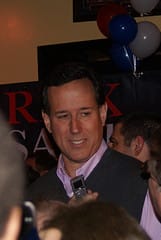 The GOP presidential hopeful is both a blessing and a curse for home-schooling advocates. Photo by Marc Nozell |
The spotlight shining on Rick Santorum’s educational philosophy is both a blessing and a curse for home-schooling parents and their advocates. As the Los Angeles Times noted over the weekend, the Republican presidential hopeful has emerged as the most prominent home schooler in America, a fact that gives momentum to a movement that is growing in popularity to include, by some estimates, nearly two million people nationwide. But the same story also identified Santorum as the GOP leader who “bashes public schools” and disparages the government’s hand in keeping education mired in the Industrial Age.
A greater range of home-school practitioners is making it harder to draw broad conclusions about the movement, but most commentators and journalists still see it far enough outside the mainstream to develop anything more than a caricature. Hence, readers end up with nonsense like that from Dana Goldstein, who writes in Slate that liberals who home school their children are violating their own progressive values by sowing distrust in public institutions. But however unreasonable it might be for Goldstein to draw upon extremes, Santorum’s weekend jeremiad only invites a similar inquisition.
That’s unfortunate for a home-schooling movement that demands more nuance to better capture the varying motivations of its adherents. “Home schoolers are now a diverse population,” Stanford political scientist Rob Reich wrote in 2005. “Indeed, it is easy to observe a kind of internecine warfare among the two most prominent advocacy groups, the Christian-based [Home School Legal Defense Association] and the more secular and inclusive National Home Education Network.” The wildly different ways states regulate home schooling make it difficult to gather data on the emerging trends, but the federal government last estimated, conservatively, that there were 1.5 million home schoolers nationwide, a 36 percent increase from 2003. Advocates say there are as many as two million children schooled at home, a number that would rival the nationwide charter school enrollment.
Santorum is hardly the first to call for a transformation of our one-size-fits-all public education system.
The trends also are blurred by the escalating enrollment of online learners at home. In theory, there’s little that separates a “home school” from a “virtual school” until we get into the arena of regulation, a word that instinctively unites most home schoolers in opposition. For the sake of their cause, home-schooling parents and advocates may have to overcome that instinct, especially as states contract more with online learning providers in ways that redefine the “factory” model of education that occupies so much of Santorum’s thoughts on schooling. Greater technologies can transform the home-school experience, but they’re not cheap. Legislatures can give home schoolers access to the growing number of virtual charter schools state by state, but it is reasonable to expect that they’ll ask for some account of their academic progress in return.
These are the subtleties that escaped Santorum during his address to the Ohio Christian Alliance, and the pool of campaign reporters got their story as a result. What the press largely disregarded was the unoriginality of the candidate’s argument. Santorum is hardly the first to call for a transformation of our one-size-fits-all public education system, and one can go back to Ronald Reagan to find a more influential threat to reduce or eliminate the federal role in education. But Santorum is our presidential candidate today, and he’s feeding extremes to a hungry national debate on a cause that, at least among a growing number of followers, is searching for the center.
